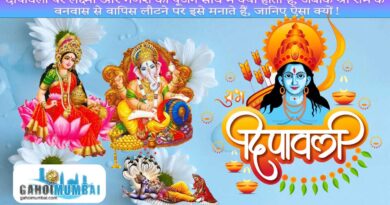Dhanteras – Significance, Legends and Celebration!
Dhanteras is also known as Dhanatrayodashi or Dhanvantari Trayodashi. It is the beginning of the Diwali festival as it is a first day of Diwali in India. It is also the festival of Tihar in Nepal.
Dhanteras’s celebration time and date:
Auspicious Dhanteras is celebrated on the thirteenth lunar day of Krishna Paksha (dark fortnight) in the Vikram Samvat Hindu calendar month of Karthik. Dhanvantari, who is also worshipped on the occasion of Dhanteras, who is the god of Ayurveda with the wisdom of Ayurveda for the betterment of mankind and to help rid it of the suffering of disease. It is also observed Dhanteras, as the “National Ayurveda Day” which was first observed on 28 October 2016.
Dhanteras Celebration and Preparations:
Generally, Dhanteras indicates the beginning of the five day festivities of Diwali, The festival is celebrated as “Lakshmi Puja” is performed in the evenings when petite diyas of clay are lit to drive away the shadows of evil spirits. Bhajans, religious songs in praise of Goddess Lakshmi, are sung and “Naivedya” of traditional sweets is offered to the Goddess. An odd tradition in Maharashtra exists where people lightly pound dry coriander seeds (Dhane in Marathi for Dhanatrayodashi) with jaggery and offer the mixture as Naivedya.
On Dhanteras, residential home are thoroughly cleansed and whitewashed, and Lakshmi, the goddess of wealth, is worshiped in the evening. The main entry are adorned with vibrant lanterns, holiday lights and traditional themes of Rangoli designs are made to welcome the Goddess of Wealth and Prosperity. To specify her long-anticipated arrival, small footprints are drawn with rice flour and vermilion powder all over the houses. On the night of Dhanteras, diyas (lamps) are ritualistically kept burning all through the nights in honor of Lakshmi and Dhanvantari.
Hindus consider this day as a really fortunate day to make new purchases, especially gold or silver articles and new utensils. It is assumed that new “Dhan” (wealth) or some form of precious metal is a sign of good luck. In modern times, Dhanteras has come to be known as the most promising occasion for buying gold, silver and other metals particularly kitchenware. The day also sees heavy buying of appliances and vehicles.
The lights are set out every night both in the sky lamps and as offerings at the base of a Tulsi plant and also in the form of diyas, which are positioned in front of the doorways of homes. This light is an offering to Yama, the Host of Death, to avoid early death during the time of the Diwali festival. This day is a celebration intended at increasing wealth and prosperity. Dhanteras involves themes of washing, renewal, and the securing of auspiciousness in the form of Lakshmi.
In the villages and small towns, cattle are decorated and worshiped by farmers as they form the key source of their income.
As per legend, South Indian Brahmin women make ‘Marundhu’ which translates into medicine on the eve of Naraka Chaturdasi that is Dhanvantri Trayodashi. The Marundhu is offered during the prayer and eaten in the early morning on Naraka Chaturdasi before sunrise. The Marundhu is consumed to eradicate the imbalance of tridoshas in the body.
Significance, Legends and History of Dhanteras:
On the day of auspicious Dhantrayodashi, Goddess Lakshmi came out from the ocean of milk during the churning of the Sea. Henceforth, Goddess Lakshmi is worshiped on the day of Trayodashi.
As per famous legend, when the devas and asuras executed the Samudra manthan (churning of the ocean) for Amrita (the divine nectar of immortality), Dhanvantari (the physician of the Gods and an incarnation of Vishnu) emerged carrying a jar of the elixir (medicine) on the day of Dhanteras.
As per another legends, it is a motivating story about the 16-year-old son of King Hima. His horoscope foretold his death by snake-bite on the fourth day of his wedding. On that specific day, his newly-wed wife did not allow him to sleep. She laid out all her ornaments and lots of gold and silver coins in a heap at the entry of the sleeping chamber and lit lamps all over the place. Then she recited stories and sang songs to keep her husband from falling asleep. The very next day, when Yama, the god of Death arrived at the prince’s doorstep in the guise of a serpent, his eyes were dazzled and blinded by the brilliance of the lamps and the jewellery. Yama could not enter the Prince’s chamber, so he climbed on top of the heap of gold coins and sat there the whole night listening to the stories and songs. In the morning, he quietly went away. Thus, the young prince was saved from the clutches of death by the intelligence of his new bride, and the day came to be celebrated as Dhanteras.
This is also known as Naraka Chaturdashi (‘Naraka’ means hell and Chaturdashi means 14th). It is also known as ‘Yamadeepdaan’ as the ladies of the house light earthen lamps or ‘deep’ and these are kept burning all over the night worshipping Yama, the God of Death. Since this is the night before Diwali, it is also called ‘Chhoti Diwali’ or Minor Diwali.
Dhanteras’s special cuisine and Recipe:
South Indian Brahmin women make ‘Marundhu’ which translates into medicine on the eve of Naraka Chaturdasi that is Dhanvantri Trayodashi. The Marundhu is offered during the prayer and eaten in the early morning on Naraka Chaturdasi before sunrise. The Marundhu is consumed to eradicate the imbalance of tridoshas in the body.
Diwali marundhu is specially made in the south India especially in Tamil Nadu and eaten by each and every family members in the morning as a medicinal value of it. To avoid annoying stomach problems having this deepavali marundhu/legiyam is mandatory. Generally diwali legiyam recipe is taken before any heavy snack or meal. It’s a wonderful sweet.
Diwali marundhu’s ingredients:
Palm jaggery/panai vellam – 750 gm
Ghee /nei – 75 gm
Honey/thean – 2-3 tbsp
Gingelly oil/nallenai – 30 gm
To roast and grind:
Coriander seeds/malli – 50 gm
Pepper/milagu – 25 gm
Cumin/jeera – 25 gm
Ajwain/omam – 25 gm
Dry ginger/sukku – 1 piece(small)
Thipili(arisi)/long pepper – 1 tbsp
Kandanthipilli – 1 tbsp
Chitharathai/galangal – 1 piece
Turmeric piece/virali manjal – 1 piece
Cardamom pods /elakai – 4-5
How to Prepare or Method:
- Firstly mix powdered Jaggery with double the amount of water and let it boil till the jaggery is liquefied entirely.
2. Now filter the liquid and keep aside.
3. Before dry roasting put turmeric piece in a mortar and pestle and smash it to pieces.
4. Same way pound arisi thipili, kandanthipilli, chitharathai, cardamom, sukku and then add this to hot kadai and roast till nice aroma comes.
5. Take this out in a plate.
6. Now dry roast coriander, cumin, pepper, omam one by one and take out in the same plate and let it cool.
7. Grind them to a make powder.
8. In the meantime, boil the palm jaggery liquid and when it’s boiling add powder, mix without lumps.
9. Now boil it and when it begins to be slightly thick add ghee and gingerly oil alternatively.
10. When it became thick check for the consistency.
11. Put a small drop on a plate and roll with hand to form very soft ball (consistency should be correct else it will become too hard).
12. When we can form a ball then it’s ready, even oil and ghee added will separate.
13. Rapidly transfer to another container to cool.
14. Now when it’s cool mix honey.
15. Preserve and can have a scoop whenever needed, its best medicine for digestion.
Dhanteras Celebration in 2018:
On Dhanteras we worshipped deities like Ganesh, Maa Lakshmi, Brahma, Vishnu and Mahesh. It is also signifies as the birth of god Dhanvanatari during Samudra Manthan who emerged out with a Amrit Kalash and Aurveda.
Auspicious time to purchase:
Morning: 7:07am to 9:15am
Noon: 1:00pm to 2:30pm
Night: 5:35pm to 7:30pm
How to worship God Dhanvantari:
Firstly installed elephant of soil and god Dhanvantari.
Use silver or copper vessel to put holy water to worship. Intake of this water before star worship.
Now worship Ganshesh Idol and perform proper Pooja.
Now take flower and Akshat in hands and worship God Dhanvantari
Chant this Mantra during worship:
Dewan Krishaan Sursanghani Peeditaangaan, Drshtva Dayalur Mrutam Vipreetu Kaamah!
Paayodhi Manthan Vidhou Prakatou Bhavandho, Dhanvantariah sa Bhagvaanataat Sada Nah!
Om Dhanvantari Dewaye Namah Dhyanaarthe Akshat Pushpaani Samarpyaami!
देवान कृशान सुरसंघनि पीडितांगान, दृष्ट्वा दयालुर मृतं विपरीतु कामः
पायोधि मंथन विधौ प्रकटौ भवधो, धन्वन्तरि: स भगवानवतात सदा नः
ॐ धन्वन्तरि देवाय नमः ध्यानार्थे अक्षत पुष्पाणि समर्पयामि
Purchasing as per Zodiac Signs:
Aries: Beneficial to purchase silver utensils and electronic items
Taurus: Glitzy Clothes and Silver-copper utensils
Gemini: Golden Jewellery and Vehicles
Cancer: Silver Jewellery, Coins and Domestic Electronic Items
Lion: Copper and Bronze Utensils, Clothes and any Golden Item
Virgo: Margaj Idol of Ganesh, Silver Items and Kitchen Items
Libra: Ladies Makeup Items, Silver Utensils, Golden Items, Decorative Items
Scorpio: Electronic Items and Golden Jewellery Items
Sagittarius: Scent Items, Golden Coins, Jewellery and Golden Items
Capricorn: Vehicles, Clothes, Silver utensils and Jewellery
Aquarius: Makeup Items, Two Wheelers, Beauty Items,
Pisces: Silver Coins, Gold, Silver Utensils, Electronic Items,




